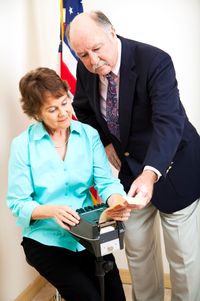
Court transcriptionists are skilled professionals who play a critical role in civil and criminal legal proceedings. Whether you need a court transcriptionist or you’re thinking about becoming one, here's what you should know about the job and all that it entails.
Training & Qualifications
In Hawaii, court reporters must obtain a certificate from the Hawaii Board of Certified Shorthand Reporters before they can transcribe any judicial proceedings in the state. There are additional requirements for those who want to specialize in certain areas of court reporting, as well. In general, aspiring transcriptionists should anticipate two to three years of postsecondary education followed by a certification or licensing exam.
 While many community colleges have acceptable programs, those who wish to work for the federal government may want to consider enrolling in a program offered by the National Court Reporters Association. These programs train their students to transcribe 225 words per minute, which is the typical requirement for positions with the federal government.
While many community colleges have acceptable programs, those who wish to work for the federal government may want to consider enrolling in a program offered by the National Court Reporters Association. These programs train their students to transcribe 225 words per minute, which is the typical requirement for positions with the federal government.
Duties & Contributions
Using stenographic equipment, court transcriptionists produce written records of verbal testimony in real time. They typically sit in on legal proceedings, like hearings and depositions, and type verbatim all that’s said. At any point, they may be asked to read back written statements or strike certain items from the record.
Court reporters are always impartial, and their work supports all parties involved in a proceeding. Judges, attorneys, plaintiffs, defendants, journalists, and private citizens all rely on a court reporter. Without their service, it would be impossible to recount verbal testimony with any degree of accuracy, which would complicate already contentious disputes.
When law firms throughout Hawaii need transcription services, they turn to Ralph Rosenberg-Court Reporters in Honolulu, HI. The largest agency in the state, these professional court transcriptionists offer a broad range of services, including preparing subpoenas, reporting depositions, and recording medical and technical testimony. They also provide clients with conference rooms in which to conduct proceedings. View their services online, or call (808) 524-2090 to discuss your reporting needs.
About the Business
Have a question? Ask the experts!
Send your question

